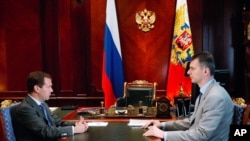Over the next six months, Russia faces parliamentary and then presidential elections. The country's carefully controlled political system received a jolt when one of the nation’s richest men unexpectedly quit politics, calling for the firing of his Kremlin “puppet master.” Mikhail Prokhorov is no ordinary oligarch. Standing two meters-tall and worth $18 billion, this 46-year-old bachelor owns a string of valuable properties, including the New Jersey Nets, a U.S. team in the National Basketball Association.
But the Kremlin thought they could keep Prokhorov under control. With the ruling United Russia party slipping in the polls, they enlisted him to lead the Right Cause Party. This is a “pocket party,” a Kremlin-controlled project designed to draw alienated voters to December parliamentary elections without posing a real threat. Instead, Prokhorov showed he had pockets of a different sort. He paid for hundreds of billboards to go up around Russia, publicizing his nationalist populist message.
“Prokhorov demonstrated he is too independent to be controlled. And independence is actually something that scares the people who are in power and the whole concept of their controlled democracy developed by Putin during the last 10 years,” said Victor Davidoff, a political analyst in Moscow:
The last Russian billionaire to go into politics, Mikhail Khordokovsky, sits in a prison cell near the Arctic, halfway through a 13-year prison sentence.
Sergei Markov, a ruling party deputy, says Prokhorov also broke the rules.
Without saying that Prokhorov should go to jail, he accuses the billionaire of bringing his business practices and money into Russian politics. Since 2000, the year Vladimir Putin came to power, the rules of Russian politics have become stricter and stricter. The opposition calls it plucking a chicken feather by feather. Mr. Putin ended direct elections for governors, senators and most mayors, brought television under Kremlin control, banned all but three loyal opposition parties, banned the option of voting against all candidates, and then lowered the minimum turnout for a valid election to one vote.
Overall, Russia’s popular mood is increasingly sour. In a poll last month, 54 percent of respondents thought December’s parliamentary elections will be “simulated.” According to Levada, the same polling company, half of Russian university students and entrepreneurs want to emigrate. And half of Russians believe that corruption in the Putin era is worse than under his predecessor, Boris Yeltsin.
In this environment, the Kremlin does not want Westerners to observe Russia’s “managed democracy.” On Monday, negotiations are to continue on the number of European observers to be given visas. Russian election officials have said they would admit only one-third of the 260 observers the European Union wants to send.
After the parliamentary elections, Russians vote in March for president. The last time, Mr. Putin waited until after the December 2007 parliamentary elections to announce that his protégé, Dmitry Medvedev, would be the ruling party candidate.
Markov says the ruling party can work with either man. But Mr. Putin, now prime minister, is widely considered to be the leading candidate. After the ruling party lost half of 12 regional elections last March, he formed an umbrella group, the All-Russia Popular Front, to attract independent voters. In the last year, he appointed men loyal to him to run Russia’s two largest cities, Moscow and St. Peterburg.
Recently he made televised campaign-style appearances - donning a wet suit to dive for archeological treasure in the Black Sea, and donning black leather to ride a Harley Davidson with a motorcycle club, “Wolves of the Night.” By contrast, President Medvedev seems pale. Two weeks ago, he hosted his annual political conference in Yaroslavl. None of his Cabinet ministers came for his keynote speech.
Davidoff said the speech lacked any reference to the presidential election. “He didn’t say a word about it. Taking into account that there are only six months to the elections, the people are getting nervous because they don’t see the candidates yet.”
More and more Russians believe that come December, Mr. Putin will announce that the presidential candidate will be Vladimir Putin.
Russian Billionaire Quits Politics, Rattling Controlled Election System
- By James Brooke




